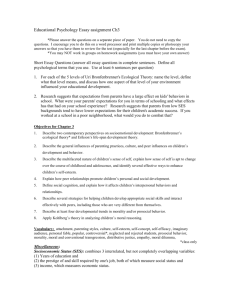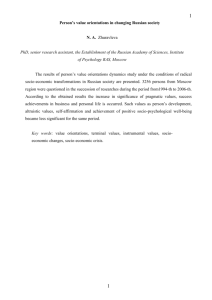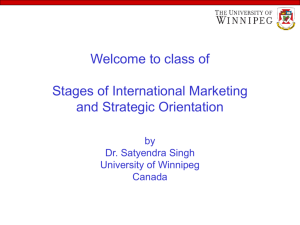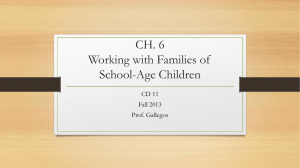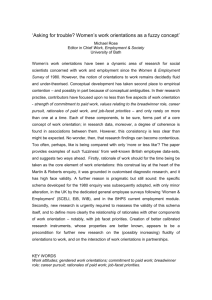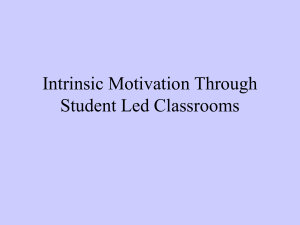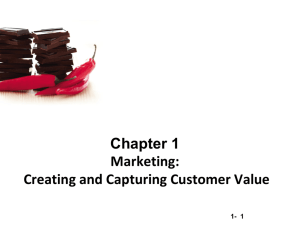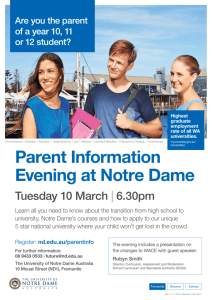Brandenberger, J. Lapsley, D., Hill, P. & Bowman, N. (2009).
advertisement
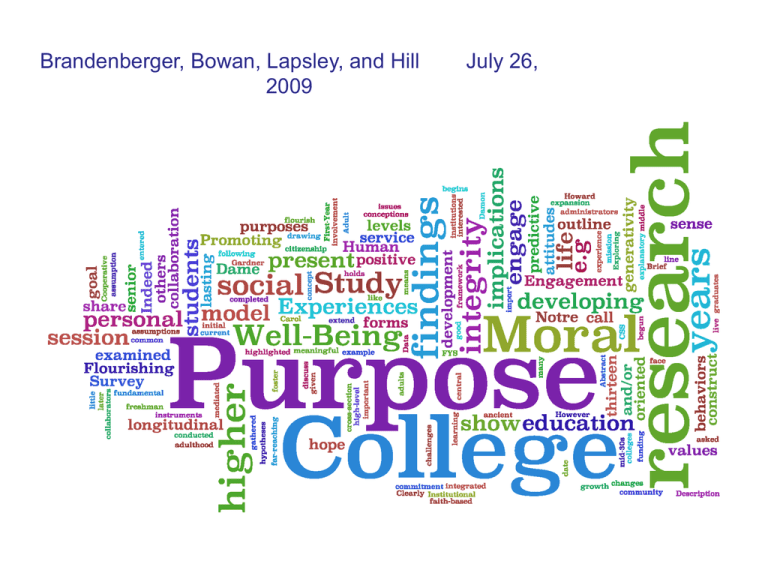
Brandenberger, Bowan, Lapsley, and Hill 2009 July 26, Moral Purpose, College and Beyond: A Longitudinal Study Jay Brandenberger, Director of Research & Assessment Daniel Lapsley, Chairperson, Department of Psychology Patrick Hill, Postoctoral Research Associate Nick Bowman, Postdoctoral Research Associate University of Notre Dame Presented at the Association for Moral Education Conference Utrecht, The Netherlands July 4, 2009 Center for Social Concerns Celebrating 26 years at Notre Dame Report to the Office of the Provost Our staff 20 plus full-time faculty, administrative staff, and support personnel Mission The Center for Social Concerns of the University of Notre Dame facilitates community-based learning, research and service informed by Catholic Social Tradition. Through the Center, learning becomes service to justice. Purpose “A stable and generalized intention to accomplish something that is at once meaningful to the self and is of consequence to the world beyond the self.” — Damon, Menon & Bronk (2004) There is an ethical dimension bound up with the desire to live a purposive life Purpose may be the ground for living well the life that is good for one to live Purpose captures the classical notions of eudemonia and points to what it means to flourish Moral Purpose Purpose is an integrative, higher order construct Developmental Model of Moral Functioning: Moral Sensitivity Moral Reasoning/Judgment Moral Motivation Purpose has the potential to animate each of the 4 components Moral Behavior The Notre Dame Study of Moral Purpose Builds on previous research Employs longitudinal designs Research Questions (sample) • Can distinct purpose orientations be identified empirically? • What is the role of higher education in fostering purpose? • Are purpose orientations predictive of future well-being, engagement, and the like? Use of HERI/CIRP Freshman and Senior Surveys Advantages Opportunity for large scale data collection on campus National comparisons Opportunity to add 20 additional questions (institution specific) Opportunity to mark data (indicators of student participation) Following the class of 1994 Time of Data Collection Surveys Completed Approx. Age 1900 entering 1st year students, approx 1850+ 18 Time 2 Spring 1994 1850 graduating seniors 1748 22 Time 3 Spring 2007 1100 matched 1stYear/Senior match, IDs 400+ 35 Time 1 Fall 1990 Population Purpose Orientations Using the 17-20 life goals on HERI surveys, we identified, via factor analyses, four purpose orientations: Financial Creative Prosocial Personal Recognition Some correlation, but distinct measures Other measures during college Personal development during college relative to freshman year Overall satisfaction with college experience Participation in service-learning activities Results: At Graduation Prosocial orientation associated with college satisfaction (Other 3 purpose orientations were not) Prosocial orientation associated with servicelearning participation; the other three orientations were negatively associated with service learning Time Three: Age 35 (approx) Used five additional measures at middle adulthood: Loyola Generativity Scale Integrity (measuring moral character and identity) Personal growth and well-being (Ryff) Purpose in Life (Ryff) Youth Purpose Scale (Stanford Univ) Sample: 416 agreed to participate (from approx 1100) Results: Time 3 Purpose orientations from HERI items again derived from factor analyses, yielding the same four factors Strong continuity of purpose orientations from senior year to age 35 (all correlations significant at p < .001) Overall, prosocial orientation highly predictive of well-being at middle adulthood Results: Time 3 ★ = p < .01 Purpose Orientation @ Senior Year Generativity Well-Being: Personal Growth Well Being Purpose in Life Integrity Prosocial ★ ★ ns ★ Financial ns ns ns ns ns ns ns ns ns ns Creative Recognition ? ns Further Analyses College volunteering and service learning participation were significant predictors of adult volunteering and adult well-being Participation in diversity workshop during college predicted prosocial orientation at senior year, and well-being (personal growth) and volunteering in adulthood Discussion Purpose orientations can be distinguished empirically Purpose orientations predict college outcomes Purpose orientations are stable overtime Prosocial orientation strong predictor of outcomes from senior year to middle adulthood: generativity, personal growth, and integrity Volunteering and SL during college predict prosocial orientation and adult outcomes Next Steps Broaden scope and sample Enhanced measures of purpose, including qualitative Collaboration and comparison across varied colleges/universities Further support/funding Thank You Contact Info: Jay Brandenberger Center for Social Concerns University of Notre Dame jbranden@nd.edu
